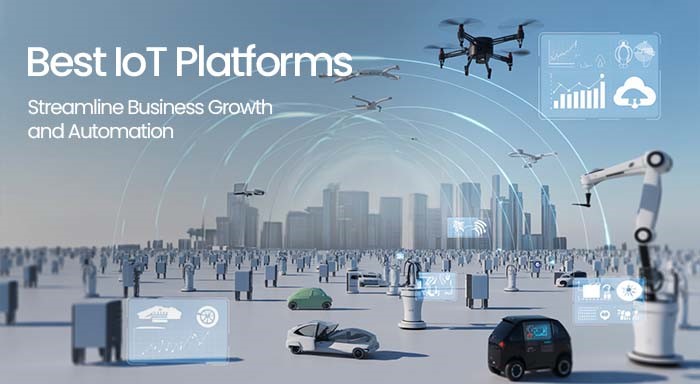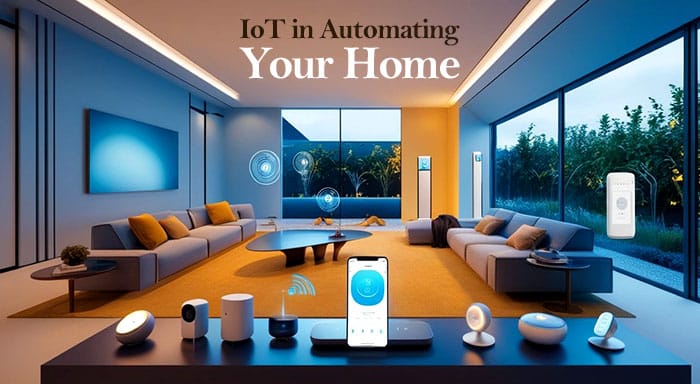The Internet of Things has revolutionized how digital devices interact with each other, automating repetitive tasks and streamlining our daily lives. Many businesses leverage IoT enabled devices to automate their operational workflow, including smart machines, predictive maintenance, and real-time asset monitoring. However, conventional methods are time-consuming and error-prone, significantly reducing operational efficiency. In 2026, there is a plethora of options available; choosing the best IoT platforms requires a strategic approach. This technical decision is crucial for businesses, as it can make or break your digital transformation journey.
Instead of manually evaluating each platform, industry insight, and real-world implementation, read this comprehensive blog that explores the complex world of IoT platforms. This guide will cover the top 10 IoT platforms in detail with their features, highlighting what makes each platform stand out.
Necessary Features to have in the IoT Platform
Before diving into the dive, let’s go through the essential characteristics that need to be considered while choosing the right platform for your business.
- Advanced Scalability: Look for platforms that can scale with your current and future business requirements, including increasing workloads and customer base. As your business grows, the platform needs to ensure high availability, flexibility, and consistent performance.
- Security Integration: As we are all aware of the increasing concern of cyberthreats, you prioritize choosing a platform with robust security practices. This may include recognition management, consistent security audits, end-to-end encryption, and authentication.
- Seamless Device Management: The platform should have the ability to manage, control, and monitor devices in real-time to ensure operational efficiency. Also, this may involve some additional features like device registration, security management, and consistent updates.
- Real-time Analysis: The platform should offer advanced machine learning and data analysis capabilities to get real-time actionable insights. This may have the capability to gather, process, and analyse the data from other devices wihtin the IoT ecosystem.
- Robust Integration: Choose the platform that can seamlessly integrate with your existing systems and tools with Open API. The best IoT platforms can easily interconnect with CRM, HTMS, ERP, and marketing automation tools to ensure a streamlined workflow.
Top 5 Best IoT Platforms in 2026
Particle
Among the best IoT platforms, particle is renowned for its edge-to-cloud solution that facilitates seamless device management and data connectivity. It supports robust security standards, like product security, remote control monitoring, and advanced encryption to protect IoT devices from potential cyber threats. With wireless connectivity support, the platform facilitates robust interconnection between physical devices by utilizing standard IoT protocols like WiFI, Bluetooth, and LoRa. These robust features make the platform beneficial for product developers and businesses of all sizes.
Key Features:
- Versatile connectivity through WiFi, Bluetooth and cellular networks
- Extensive community support to facilitate communication between developers
- Comprehensive platform that offers hardware-to-cloud solution
The real-world application of the Particle includes industrial asset monitoring, automotive vehicles, HVAC systems, and environmental monitoring across wireless sensor networks.
Amazon Web Services (AWS) IoT Core
AWS IoT Core has become one of the best IoT platforms that sets the benchmark for enterprise deployment. Powered by AWS (a global leader in cloud computing infrastructure), it offers a secure, scalable, and robust solution for integrating a wide range of devices. With its strong security and multiple protocols, it is a go-to platform for enterprises, like industrial, commercial, manufacturing, and more.
Key Features:
- Supports pay-as-you-use model, means pricing depends on your usage
- Integration with 200+ AWS services, like Lambda and SageMaker
- Connect and manage millions of devices and trillions of messages
- Advanced security features ensure real-time monitoring and threat detection
Therefore, these platforms are often used for large enterprises, intriguing industrial IoT deployments, and businesses that already utilize the AWS ecosystem. As a result, companies like BMW and Phillips transformed their operations and lowered downtime by up to 30% with AWS IoT Core.
IBM Watson IoT
IBM Watson IoT prioritises secure communication, AI-driven automation, flexible connectivity, and advanced analytics. It allows businesses to collect, process, and act on data insights across industries like manufacturing, automobiles, healthcare, and assets. Additionally, it supports blockchain-optimised IoT protocols to ensure data reliability and real-time analytics to keep track of device performance.
Key Features:
- Strong regulatory compliance, especially in healthcare and financial industries
- Offers inclusive edge computing solutions for smooth data collection and processing
- Effortless integration of AI tools for predictive maintenance and advanced analytics
Its real-time monitoring data insights enable businesses to identify issues before system failure occurs. For example, Thyssenkrupp Elevator integrates IBM Watson IoT platform across 130,000 elevators globally. This results in approx. 25-30% lowering downtime, saving costs, and improving customer experience.
Microsoft Azure IoT
Microsoft plays a major role in the Internet of Things revolution with its Azure IoT platform and other related services. They design the Azure IoT platform with simplicity, ease of use, and enterprise integration in mind. With its extensive IoT device management and bi-directional communication with IoT devices, it offers scalable solutions for diverse industries. This best IoT platform is accessible across healthcare, retail, energy, and automotive industries, offering factory maintenance, in-store analytics, and logistic monitoring.
Key Features:
- Digital twin cloud services for creation and management of physical environments
- Seamless integration with Microsoft tools like Office 365, teams, and other
- Offers pre-build templates to optimise and speed up deployment cycle
- Comprehensive analysis and visualization with Azure services like Machine learning and Power BI
Businesses that already operate on Microsoft technologies and value fast time-to-market can get the most of these best IoT platform benefits. For example, companies like Schneider Electric leverage Azure IoT to deliver smart building solutions that significantly reduce energy consumption by 20-30%.
Google Cloud IoT
Initially in 2017, Google, which is a popular provider of cloud solutions, launched its Cloud IoT Core platform for revolutionising the entire IoT ecosystem. With BigQuery and advanced AI model integration, the platform analyses a massive amount of data to get real-time data insights. And foster seamless data exchange among interconnected devices within cloud-based environments. With the best IoT platforms, users can also access other Google Cloud services to facilitate data analytics and machine learning integration.
Key Features:
- With machine learning integration, it offers built-in AI/ML capabilities
- Support edge computing to ensure prompt responses, perfect for time-sensitive applications
- Time-sensitive and budget friendly solution for complex data processing
With these practices, Google Cloud IoT has become the perfect platform for retail analytics, smart cities, and asset management. For example, smart parking companies like SFpark leverage it to manage thousands of IoT sensors. They perform real-time data processing to monitor parking space availability, significantly reducing traffic congestion and enhancing urban mobility.
Final Verdict:
While no platform is perfect, every IoT platform comes with its unique strengths and limitations. Meanwhile, the choice will depend on your specific requirements, team capabilities, and business goals. It is essential to understand that the platform you choose today will impact your future digital transformation journey. Irrespective of whether you are a manufacturer, healthcare provider, or a tech-savvy IoT developer, choose the best IoT platforms outlined in this guide that meet your requirements.
For the best-informed decisions, thoroughly evaluate the features, strengths, and limitations of each platform that can scale with your business growth. With the right IoT platform, you and your business can unlock new potential, enhance customer experience, and gain a competitive edge in the volatile world of today.








